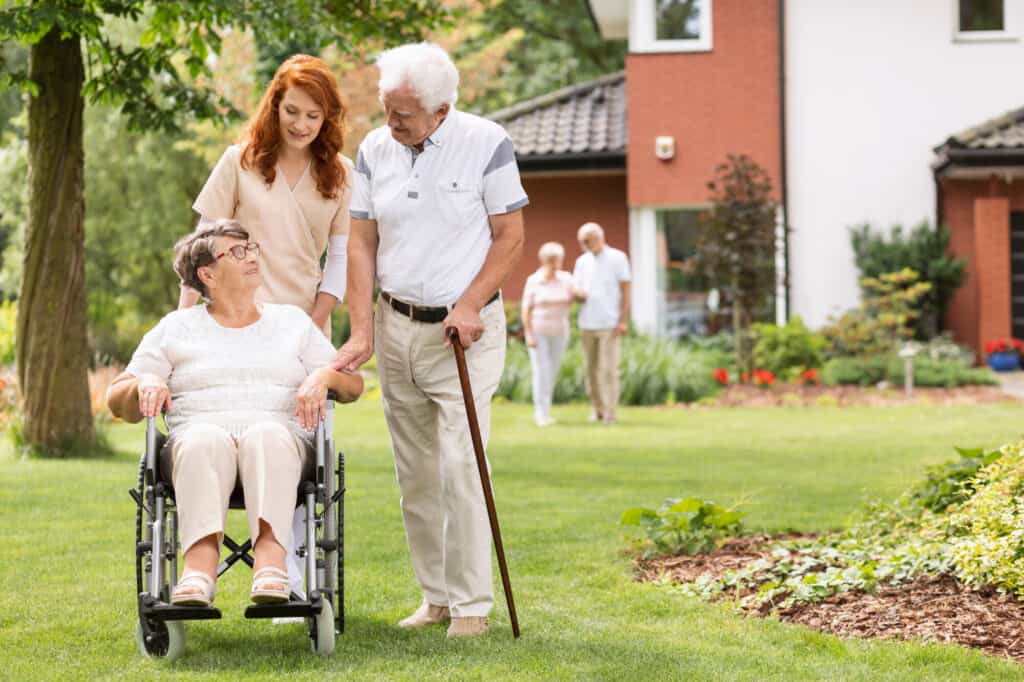Daylight savings time will be here before we know it: March 12, 2023. Are you and your elderly loved ones prepared for it? It can be difficult for our older loved ones to deal with changes in their environment or schedule. This is even true for those in senior living communities. This is particularly true for daylight savings time. Consider the fact that 40% of people over 65 years old struggle with some kind of memory impairment. When it’s time for us to lose an hour this March, this cognitive issue can be even starker. Dealing with such a day-to-day shift can be a challenge for our seniors. The good news is that there are ways we can help them through this process. Keep reading to learn tips on helping your senior family members cope with daylight savings time.
The Basics of Daylight Savings Time
Daylight Saving Time (DST) happens twice a year. Coming up is when we move our clocks forward in the spring, as opposed to backward in the fall. This means we lose an hour of sleep in the spring and gain an hour in the fall. The idea of DST started in the late 1800s. Its purpose was to save energy and give people more daylight in the evenings. Germany was the first country to use DST during World War I. Other countries soon followed. In the United States, DST was first used during World War I. Not every country uses DST, and some have stopped using it altogether. DST can cause confusion and disrupt sleep patterns – especially for seniors who might be living with dementia. Still, it also provides more daylight in the evenings for outdoor activities. Some argue that DST saves energy and reduces traffic accidents, too. While opinions on DST are divided, it remains a part of our lives and an important topic for discussion. Your senior loved one deserves some help to cope with this drastic change in daily living.
Adjusting Sleep Schedules
Seniors can start by going to bed 15-30 minutes earlier each night leading up to DST. This can help them slowly, but surely, adjust to the time change without being too dramatic. Seniors should also avoid heavy meals and caffeine close to bedtime. They should establish a consistent sleep schedule and stick to it, even on weekends. After daylight savings time has passed, they’ll ideally be much better adjusted since they’d already been intentional about this. If they’re still having trouble adjusting to the time change, they might need professional help. They can talk to their healthcare provider or a sleep specialist for additional guidance and support. It’s for reasons like this that living in a senior care community can be of such value. These environments offer them the help they need at all times – even after DST.
Taking Advantage of Natural Light
Exposure to natural light in the morning can help regulate the body’s internal clock. Taking advantage of natural light can help seniors adjust to daylight savings time. This is because natural light helps the body produce melatonin, a hormone that helps regulate sleep. Seniors can get outside and go for a walk, for example. They could also sit on a porch or balcony or simply open the curtains to let in natural light. Some might consider investing in a light therapy box. This next tool simulates natural light and can be used indoors. Seniors should aim to get at least 30 minutes of natural light exposure in the morning. This is the best way to help their bodies adjust to the time change.
Practicing Relaxation Techniques
Relaxation techniques can also prove useful for seniors trying to cope with major schedule changes. These include things such as meditation, deep breathing, and yoga. These practices can help calm the mind and promote better sleep. Seniors can find guided meditation or relaxation exercises online or through apps. Taking a warm bath or shower before bed can also help promote relaxation. Seniors can also consider practicing gentle yoga or stretching before bed. They should experiment with different relaxation techniques to find what works best for them. Staying calm during this transition is essential for them to adjust well.
Spend Quality Time with Them
Spending quality time with seniors can help keep their minds sharp. When it’s time to adjust to DST, they’ll be that much more prepared to cope with it. Consider engaging them in activities that stimulate the mind. Examples include reading, playing games, or doing puzzles. These can improve both cognitive function and memory. Seniors with proper memory care available can also learn new skills. This could involve playing an instrument or even painting. Spending time with loved ones can also help reduce feelings of isolation and depression. This can improve overall mental health. Quality time like this can be of particular value for those living in assisted living facilities already. For further guidance, check out this article on visiting loved ones in a senior living community.
Seek Professional Help
Placing seniors in senior living communities can provide them with the care they truly need. These communities offer a range of services. Some include assisted living, memory care, and skilled nursing. This variety is essential to meet the needs of seniors with different health conditions. These communities offer 24/7 care and support from trained staff. They also provide social activities and opportunities for seniors. Seniors can also enjoy chef-prepared meals, housekeeping, and transportation services. Senior living communities can provide peace of mind for families, too. You deserve to know that your loved one is safe and well-cared for. This would even remain true during a major transition like daylight savings time.
Consider a Senior Living Community
As Daylight Savings Time approaches on March 12, you and your family are hopefully more prepared after reading this article. In some cases, your senior loved one might really struggle with a shift in the daily schedule like this. That’s why it can be smart to place them in a reputable senior living community. In fact, that’s where we can help. Our seniors have all of the care and attention they need to adjust to any major life changes. For more details, check out our available services for seniors in your area.




